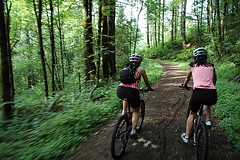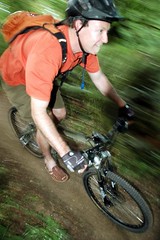The Forest Park Conservancy recognizes that off-road cyclists are a legitimate user group whose needs are not currently being met.
— from the introduction of White Paper on Off-Road Cycling in Forest Park
The Forest Park Conservancy (FPC), in collaboration with a range of stakeholders, has released the final version of its White Paper on Off-Road Cycling in Forest Park.
The paper (download PDF here) is an effort to take a closer look at existing conditions and issues around increased access for bikes in the 5,000+ acre urban park.
(Photos © J. Maus)
In May 2007, the FPC brought together a nine-member “Off-Road Cycling Ad Hoc Committee” to create the white paper. The move was an acknowledgment that the increased popularity of mountain biking and an uptick in user conflicts and illegal trail use in the park — coupled with an existing management plan that was last updated in 1995 — were on a collision course unless the issue was dealt with.
The completion of the white paper comes amid improved relations between off-road advocates, the FPC, and park’s official manager, Portland Parks and Recreation (PP&R). There is also a recently renewed sense of urgency in the community for more off-road trails (in Forest Park and elsewhere) that has been echoed by City of Portland Parks Commissioner Nick Fish.
Tom Archer, member of the committee and director of advocacy for the mountain bike advocacy group Northwest Trail Alliance, called the white paper a “starting point” and said that relationships cemented during the two-year effort to finish it are already paying off. “The process of creating this white paper has definitely helped move this issue along… It’s allowed us to develop some key relationships and talk about issues not just in Forest Park but throughout the city.”
“We wanted to make sure if we add new users, we’ll be doing more with more, not more with less.”
— Jim Labbe, Portland Audubon Society
Archer likened the white paper to an important piece of a larger puzzle that helped all sides “find common ground.”
Jim Labbe with the Portland Audubon Society, has had serious concerns about opening up Forest Park to new users. Labbe’s concerns were how the Parks Bureau, with declining resources, would be able to manage a spike in trail traffic; “We wanted to make sure if we add new users, we’ll be doing more with more, not more with less.”
In addition to making sure the City had a management strategy in place, Labbe told me he was concerned with the “where and how” bikes would use the park. “I thought it was a great step,” he said, “Now we have a framework to move forward within Forest Park, when we decide to do so.” (Both Archer and Labbe are also on the board of the Gateway Green project, another area where mountain bike advocates are hoping to have ample trails to ride.)
While most of the process to complete this white paper was smooth, the idea of “trail-sharing” (mixing bikes with hikers on trails where currently bikes are not allowed) drew the most disagreement. Writing on the NWTA website, Archer wrote:
The idea of trail sharing of existing singletrack trails was one of the most sensitive issues. Most of the committee felt that certain trails, most notably Wildwood, should be off limits to bikes. Myself and Mark Pickett [committee member and owner of Revolver Bikes in North Portland] argued to keep that language out (for a number of reasons).
On the committee, Archer and Pickett were in the minority in thinking that trails like Wildwood should be left open for consideration for trail sharing. According to the white paper, they felt there is “insufficient information to make a determination regarding any trail exclusions.”
Archer said the Parks Bureau made it clear to the committee that the goal of this white paper was not to develop any policy. “Some of the committee wanted to exclude some trails, but we felt that it wasn’t up to us to decide that,” he said.
In the white paper itself, it’s blatantly clear that it’s not a matter of if bikes should be allowed on trails, but where and how to implement the increased access. From the white paper’s introduction:
The Forest Park Conservancy… recognizes that off-road cyclists are a legitimate user group whose needs are not currently being met… The potential exists to provide a richer experience, on a sustainable framework of singletrack trails.
The document also makes it clear that any new trail access for bikes (whether it comes in the form of newly built trails, or on existing ones) will be done with the utmost care to “minimize impacts on wildlife and interior habitats within the park.”
There is also a strong emphasis on education to mitigate the amount of illegal trail riding that goes on. The white paper states an intention to fund and develop a new “Forest Park Ambassadors” program to patrol the park.
As for the “where” of new bike access, the white paper identifies several areas “that might be suitable… for enhancing and/or expanding off-road access.” Listed in the document are the Saltzman Rd./Power Line Area, Fire Lanes 5 and 7, the Camp Tolinda vicinity, the bottom of BPA Power Line and Newton Road and access from a new parking lot slated for NW Yeon Ave.
The white paper lists one potential area where bikes currently aren’t allowed that might be an option for a shared trail: Firelane 4 (from Leif Erikson at milepost 5.15 to the lower gate on Saltzman Road).
Portland Parks and Recreation is slated to embark on a comprehensive analysis of more bike access in Forest Park (and elsewhere). Recently, off-road advocates met with staff in Commissioner Fish’s office to discuss the issue, and in June, PP & R signed an official trail agreement with the NWTA.
In the end, it seems increased off-road riding opportunities in Forest Park are imminent, but as stated in the conclusion of the white paper, “Forest Park is an unparalleled natural resource and the bar must be set high for any expanded access.”
— Download a PDF of the 17-page, White Paper on Off-Road Cycling in Forest Park here.




